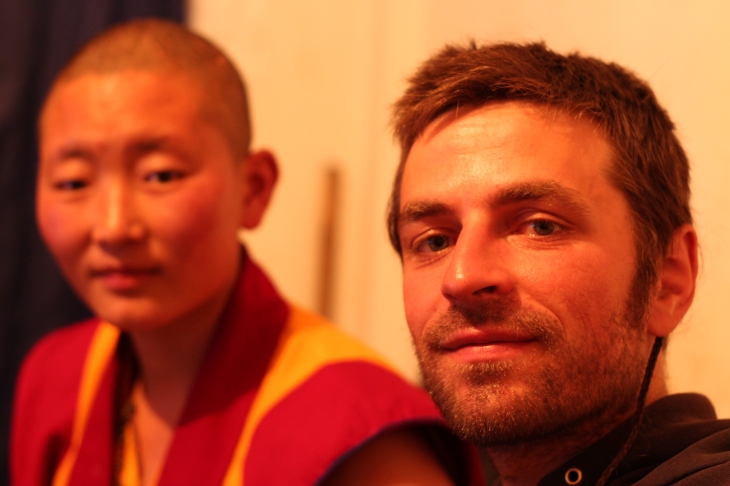Stumbling along like fools – not knowing the Tibetan word for “Hello” or “Thank You” let alone “we’re cold and have no idea where to sleep!” – we bumped into a nun named Sadenchen.
Actually we were in a daze. A sleepless Himalayan night bus had suddenly deposited us right at Tibet’s largest Mani Wall in what is now Chinese-controlled Qing Hai. It was another planet – hundreds and hundreds of beautifully dressed Tibetan pilgrims chanting with prayer beads as they slowly circled the literally billions of intricately carved sacred stones en masse. We didn’t know what we were witnessing, but it was something big.
Sadenchen spoke no English. We stopped her in her bright red monk robes to pantomime our need to find a place to stay. What happened next will forever stand in my mind as the paramount of human kindness.
Without a word or a moment’s hesitation we were taken in to her home and family. For four days we were fed, doctored and entertained. Together we danced, laughed and visited an 8th century Buddhist temple. In a modest Tibetan home with no toilet or running water and a family bed in the living room, we were housed in the special room kept for illegal photos and shrines to the Dali Lama.
Our friend Sadenchen was the toughest woman I have ever met. Cooking and caring for her entire family and dysfunctional alcoholic father, scars cover the top of her head testifying to a childhood of street fighting before taking lifelong monk vows at age sixteen. She is illiterate in both Tibetan and Chinese, and has lived the kind of life which leaves her closely shaved head specked with grey hairs at age 24.
One day Ed and I tried to help her salvage cinder blocks from an earthquake demolished home: a task which left us both breathless, sweaty and weak after just two hours and which Sadenchen did for 10 painful hours straight in her red red robes.
I saw Sadenchen morn deeply the death of a drowned fly. She kneeled for a long time trying to resuscitate it.
Despite our best efforts Sadenchen seldom smiles. Her’s is a life marked by a palpable sadness – a deep wound left by Chinese occupation of her homeland and the expulsion of the Dali Lama. But it is equally defined by overwhelming kindness and generosity. In our short stay with her family – which was entirely supported by her mother selling yak butter on the street – we were never once allowed to pay for a meal, a taxi, or a bus. We were given prayer beads, medicine, Tibetan scarves, family members to stay with in the next town down the road, and yak meat cooked over yak-dung fire (Sadenchen’s vows and spiritual beliefs keep her from eating meat, but she dutifully cooks it for her family before sitting down to a small bowl of white rice herself). And of course, more yak milk tea than would be humanly possible to consume.
Then one night, sitting by a warm purring stove, my friend Sadenchen explained through pictures and gestures that she plans on self-immolation.
If you’d like to help us produce this documentary and support the communities along the Mekong River, you can donate through paypal at the bottom of LostontheMekong.com


I am very saddened to read of Sadenchen’s plan of self-immolation. Why would she leave her family like this?